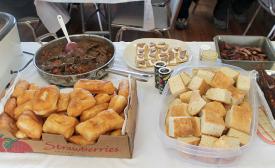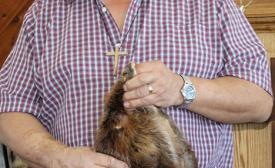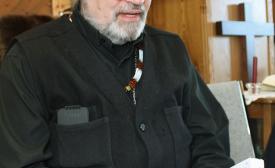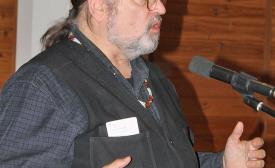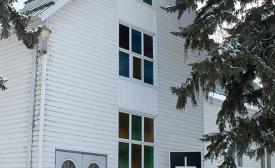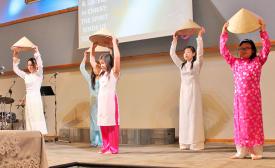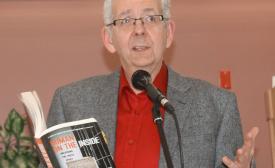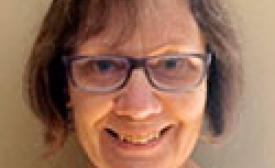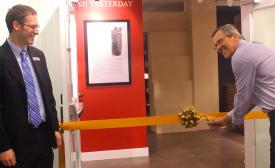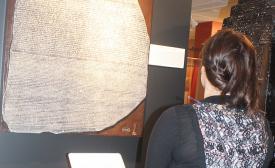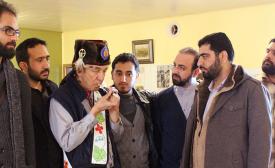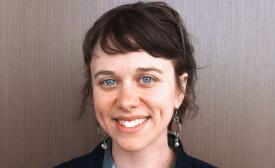Volume 19, Number 8
Changes coming to CM
Some significant changes are occurring at Canadian Mennonite.
Out of control
“A disciple is not above the teacher, nor a slave above the master; it is enough for the disciple to be like the teacher, and the slave like the master. If they have called the master of the house Beelzebul, how much more will they malign those of his household! So have no fear of them; for nothing is covered up that will not be uncovered, and nothing secret that will not become known.
Correcting a common misunderstanding
Matthew 10:37 reads, “Whoever loves father or mother more than me is not worthy of me; and whoever loves son or daughter more than me is not worthy of me.”
Readers write: April 13, 2015 issue
Bible contains the word of God but isn’t the Word of God
Re: “Bible written without an understanding of genetics” letter, March 2, page 14.
Proud banners that need shredding
I was on my Monday morning transit commute sitting near a group of people who loudly reminisced about their weekend exploits. Without embarrassment they relived what could be remembered of a wild party’s excitement, exploits and emissions—despite the presence of strangers and a few grandmas. The visualizations were a challenge to forget.
The last church I visited
My wife and I arrived in Vancouver in 1994 with our two sons, aged 9 and 12. I had been an air traffic controller, then law enforcement officer in Hong Kong. As a landed immigrant in Canada, I found some odd jobs before going back to school at the B.C. Institute of Technology and beginning a career with a mechanical engineer consulting firm.
Learning from each other
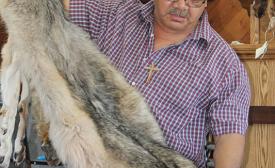
Charles Simard holds a timber wolf hide as he explains to the Partnership Circle participants in Manigotagan, Man., their relationship with the land along the eastern shores of Lake Winnipeg that has been their home for many generations. (Photo by Evelyn Rempel Petkau)
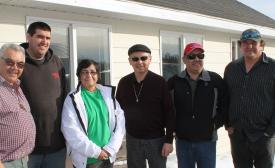
Members of Manigotagan Community Fellowship, Charles Simard, left, Chris Martin, Shirley Smith, Norman Meade, Dennis Sinclair and Danny Moneyas, host the spring Partnership Circles meeting on March 14, 2015. (Photo by Evelyn Rempel Petkau)
Although less than a three-hour drive from Winnipeg, Manigotagan seemed a world away. This Metis community of about 200 lives in the dense forest along the eastern shore of Lake Winnipeg. It abuts the much larger reserve community of Hollow Water (population 1,200) whose border has become more porous since the passing of Bill C-31 which returned treaty status to some of the Métis.
Western Christians need to ‘get out of the way’
Mark MacDonald is convinced that “it is the time for something great to happen and that the best thing we can do is get up and wait. There is no stopping it.” But the Anglican Church of Canada’s first national indigenous bishop admits that the church has likely stood in the way of God’s work at times and it may need to step aside.
‘We weren’t on the same page’
“We have not left. Maybe the [area church] leadership has left, but we have stayed with the Confession of Faith in a Mennonite Perspective.” With these words, Artur Esau, Hague Mennonite Church’s pastor, spoke of his congregation’s withdrawal from Mennonite Church Saskatchewan.
Mennonite Church Alberta ‘in the black’
Vietnamese Mennonite Church in Edmonton may seem small, but it is a hosting powerhouse! On March 20 and 21, 2015, the congregation of about 70 adults and 23 youth welcomed pastors, delegates and visitors to the 86th annual session of Mennonite Church Alberta.
Edmonton congregation seeks to be openly inclusive
At the pastors council meeting, First Mennonite Church called for prayer as a letter that will be sent to all Mennonite Church Alberta congregations was shared. The letter presents a motion passed on Feb. 8: “As a congregation, we ...
‘We sit and eat at the same tables’
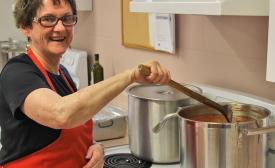
Cook Carol Weber of Stirling Avenue Mennonite Church shows off the soup stirrer created by set-up volunteer Dan Ulrich when he found out that the church had no spoons long enough to stir the deep soup pots used for Stirling Avenue’s community dinners. (Photo by Dave Rogalsky)
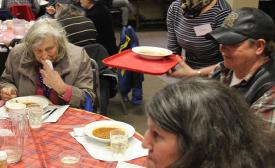
Volunteer Kim Barber, standing right, a Wilfrid Laurier University music professor and professional singer who attends Rockway Mennonite Church, serves guests at Stirling Avenue Mennonite Church’s community dinner. (Photo by Dave Rogalsky)
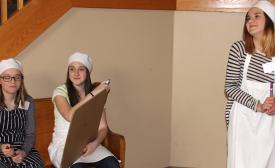
Young volunteers Cate, Ruth and Annalee of First and Rockway Mennonite churches prepare the menu board so that guests can see what is being served at Stirling Avenue Mennonite Church’s community dinner on March 14. Volunteers like these young women help set up the tables and chairs, and are gone by the time guests arrive. (Photo by Dave Rogalsky)
“Grab a coffee and go and sit down. You get served at the table. They’re really nice here,” said one guest to another on March 14 of the community dinners served every Saturday night from November through April at Stirling Avenue Mennonite Church in Kitchener.
‘Showing up with each other’
Years ago, when Abe Janzen had just started his work as Mennonite Central Committee (MCC) director, he was taken to prison for a visit. There, he said, he “realized how biblical and terribly important and endlessly necessary” this ministry is. “It’s not about fixing things, but about showing up with each other.”
Not in his wildest imagination
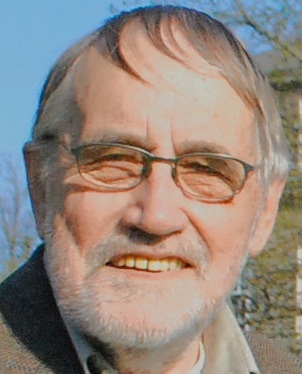 When as a young teenager Larry Kehler delivered coal in the Altona, Man., area for his father, his wildest imagination could not have taken him to where his life eventually led.
When as a young teenager Larry Kehler delivered coal in the Altona, Man., area for his father, his wildest imagination could not have taken him to where his life eventually led.
Canadian Mennonite bids farewell to Evelyn Rempel Petkau
Evelyn Rempel Petkau is retiring after more than 18 years of reporting for Canadian Mennonite. She was hired as the provincial editor for Manitoba in 1997, just after Mennonite Reporter changed its name and format to become Canadian Mennonite.
SOS for Syria
In the early 1900s, SOS became the worldwide distress signal, but typically in maritime situations. These days it’s used as a sense of urgent message or appeal for help from anybody in any situation.
‘Inspired by his own vision’
A one-of-a-kind collection of museum-quality art and artifact replicas has found a permanent home at Columbia Bible College. With the cut of a ribbon, the Metzger Historical Collection was officially opened to the public on March 14 in the basement of Columbia’s Resource Centre.
‘The best possible reward’
“I’ll intentionally call you my sister, for I have two and I love them so much. Now I have three and I love them all to the degree that I’m ready to die for them. So you are really beyond a friend for me.”
Growing Mennonite
It wasn’t until Grade 6 that I realized it was possible to be more than just a Mennonite. Our teacher asked us to come up with one word to described ourselves. One of my classmates chose the phrase, “Russian Mennonite.”
‘Islam is not ISIS’
A little girl stood on the snowy steps of Alberta’s Legislature in Edmonton, holding a sign that declares, “ISIS is not Islam,” during a rally by members of the local Muslim community on March 22, to exclaim that they do not support Islamic State (IS).
Lament for those ‘suffering in silence’
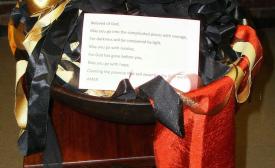
A basket of cloth strips was used to symbolize the pain victims of John Howard Yoder’s sexual abuse at Anabaptist Mennonite Biblical Seminary. The note reads: ‘Beloved of God, may you go into the complicated places with courage, for darkness will be conquered by light. May you go with resolve, for God has gone before you. May you go with hope, claiming the promise that evil never has the last word. Amen.’ (Photo by Rich Preheim)
For 40 years, women who had been sexually violated by John Howard Yoder were left suffering in silence while the Anabaptist Mennonite Biblical Seminary (AMBS) professor became one of the most influential theological voices of the 20th century. On March 22, 2015, AMBS publicly apologized for long ignoring their cries for justice.


